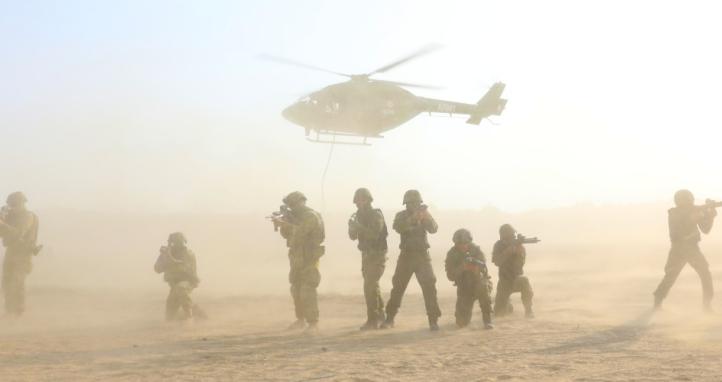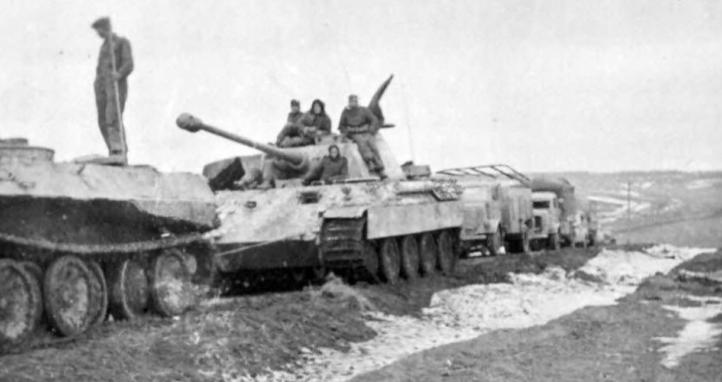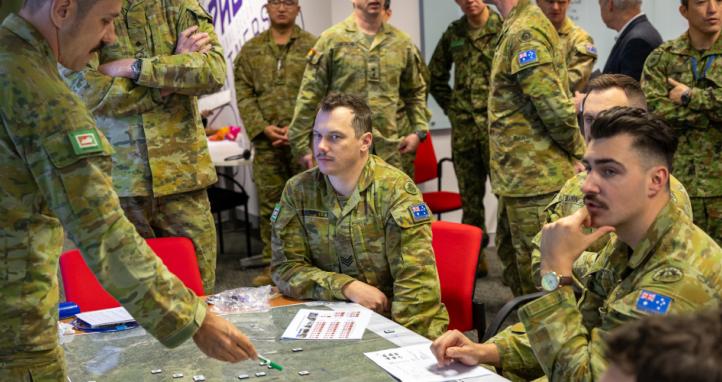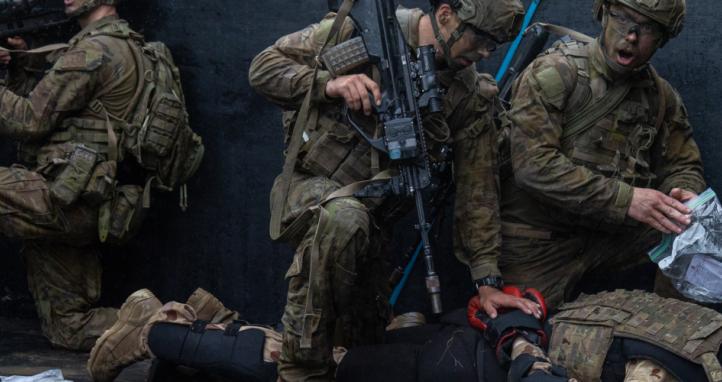Listen to this collection of podcast episodes to learn more about the experience of Australians in War. Hear from experts like Stephanie Speck on strategic communication in fragile environments to Mark Ascough on the challenges facing military intelligence.
Stephanie Speck – Strategic Communication: A Tool for Change
Stephanie Speck has lived and worked in more than 20 countries, accumulating almost 25 years experience as a strategy and communications adviser, supporting democratic reform in fragile and conflict-affected settings. Stephanie’s expertise includes the design and programming of cross-government reform strategies, strategic communication, and advocacy initiatives; public policy development, counter-terrorism communication strategies, government public affairs and crisis communications.
Some of the topics we covered include: strategic communication as a tool for change, 'those who tell the stories rule society', and when expectations and reality do not align.
Harry Moffitt – A Humble Warrior
Anthony ‘Harry’ Moffitt is a recently retired veteran of the Australian Defence Force where he served for nearly 30 years. Most of that time he spent in the Special Air Service Regiment, more commonly known as the SAS. During his time, he completed 11 active service deployments amassing nearly 1000 days on Special Operations globally.
Since leaving the Army, Harry has become a registered psychologist and runs a human performance consultancy working with sports teams, the military and industry. He is also the Asia-Pacific Director for the Mission Critical Team Institute. He is also the lead singer and songwriter for the rock band The Externals.
Harry also recently authored his memoir, 'Eleven Bats', which is a book about his military service, the SAS and his love of cricket. Along with the book, some of the other topics we covered are: his journey into the SAS, the first years of the war in Afghanistan, and changes in how the SAS came to be used.
John Blaxland – Reflections on Australian Military Operations and Lessons Learnt
John Blaxland is a Professor of International Security and Intelligence Studies and former Head of the Strategic and Defence Studies Centre at the Australian National University.
Prior to his academic pursuits, John enjoyed an extensive career as an Intelligence Officer in the Australian Army including as the principal intelligence staff officer for the Australian infantry brigade deployed to East Timor in September 1999, an intelligence exchange officer in Washington DC, Director Joint Intelligence Operations at Headquarters Joint Operations Command and Australia’s Defence Attaché to Thailand and Myanmar.
As you will hear, we covered a broad range of subjects, including: John’s Army career and journey into academia, building the cultural knowledge of Timor-Leste, and Understanding the human terrain and culture – critical to mission success.
Andrew Quilty – Perspectives of a Photo and Investigative Journalist
Andrew Quilty started his career in Sydney, moved to New York City and eventually to Kabul, Afghanistan, after a two-week trip to photograph the Afghan cricket team turned into an odyssey now into its eighth year. He has worked in all but a handful of Afghanistan's 34 provinces, photographed for most of the world's premiere publications and won several accolades, including a World Press Photo Award, a Polk Award, several Picture of the Year International awards and the Gold Walkley – Australian journalism's highest honour.
We covered many topics, including: the danger of oversimplified narratives of conflict, second-order effects of coalition operations, and the dangers of life as a war journalist.
Brendan Cox – A Lifetime of Service
Brendan Cox has served in the Australian Army for 25 years, first as a soldier, and later as an officer in the Infantry Corps. During his time, he has done a number of operational tours including to Bosnia, East Timor and Afghanistan. For his exemplary service, he has received a number of awards, including a Commendation for Distinguished Service in the Australia Day Honours List in 2014.
Brendan is now the Chief Executive Officer of Legacy Brisbane, an organisation that supports families who are experiencing hardship due to the loss or injury of a loved one while serving in the armed forces. Some of the topics covered are: healing our own wounds by helping others, responsibilities of command, and building partnerships with foreign forces.
Dejan Mujkanovic – From Bosnian Refugee to Australian Army Officer
Dejan Mujkanovic is an Australian Army officer with 19 years of military experience. He has completed several tours of Afghanistan and also deployed to East Timor. He was born in Bosnia in 1980 and experienced the full brunt of the civil war in the 90’s. His hometown of Prijedor made global news due to the campaign of ethnic cleansing committed by the Bosnian Serb forces seeking to forcefully remove the Bosnian Muslim and Bosnian Croat populations from the area. As a result of these crimes, many of Dejan's extended family members were lost in concentration camps, which sadly includes his father, Senad Mujkanovic, who was killed in the Omarska concentration camp in 1992. In the ensuing chaos, Dejan was separated from his mother and his siblings and they have lived apart ever since. During his journey, he was forced to spend over two years in various refugee camps in Croatia and Austria. In late 1995, he was fortunate to settle in Australia with his grandmother. Now, 25 years later, Dejan is married and a proud father to his son.
Some of the topics covered are: his reason for joining the Army, how the war in Bosnia started for him, and what good soldiering looks like.
Mark Ascough – On Military Intelligence
Brigadier Mark Ascough is the current Director General of Intelligence at Headquarters Joint Operations Command of the Australian Defence Force. Brigadier Ascough joined me to talk about all things intelligence and how he sees the field evolve into the future. Some of the things we covered are: Mark's background and entry into the Army, life as the J2, HQJOC, the role of 'Intelligence', and impact of the 'Five Mores'. Touching on the challenges for future intelligence professionals, the dangers of bias and moral courage in intelligence analysis. Discussing how to train for ethical challenges and the importance of understanding cultures. When it comes to the Australian intelligence community – is there too much or not enough power?










Let me know if you have an interest.